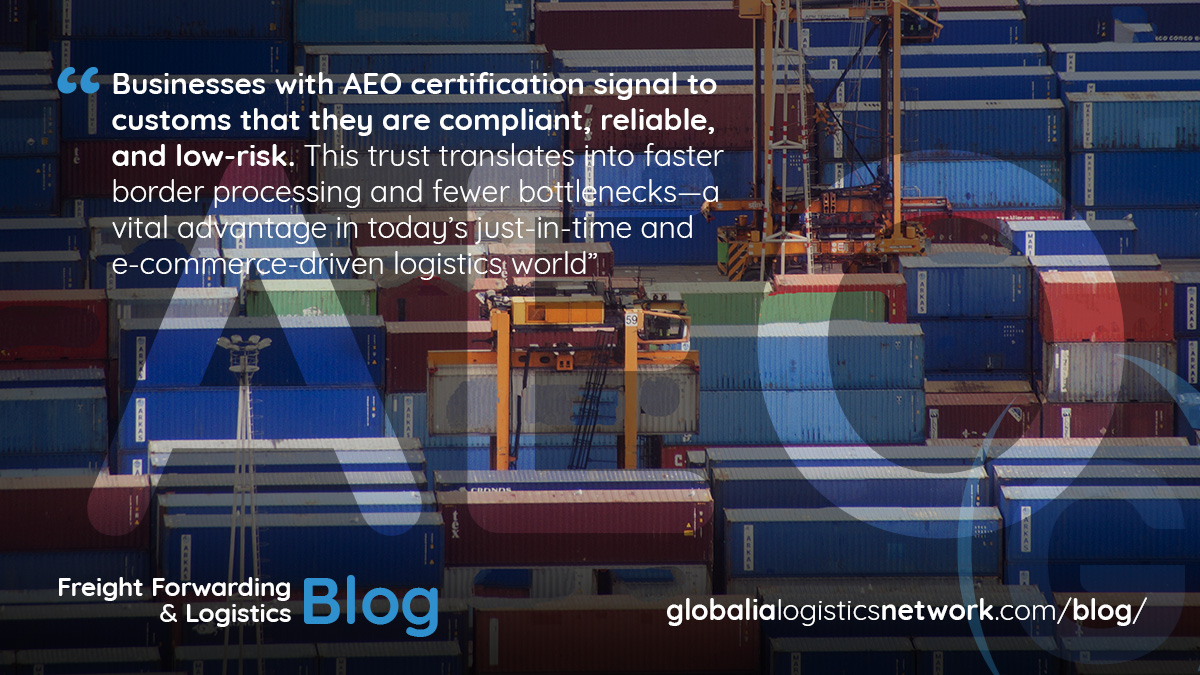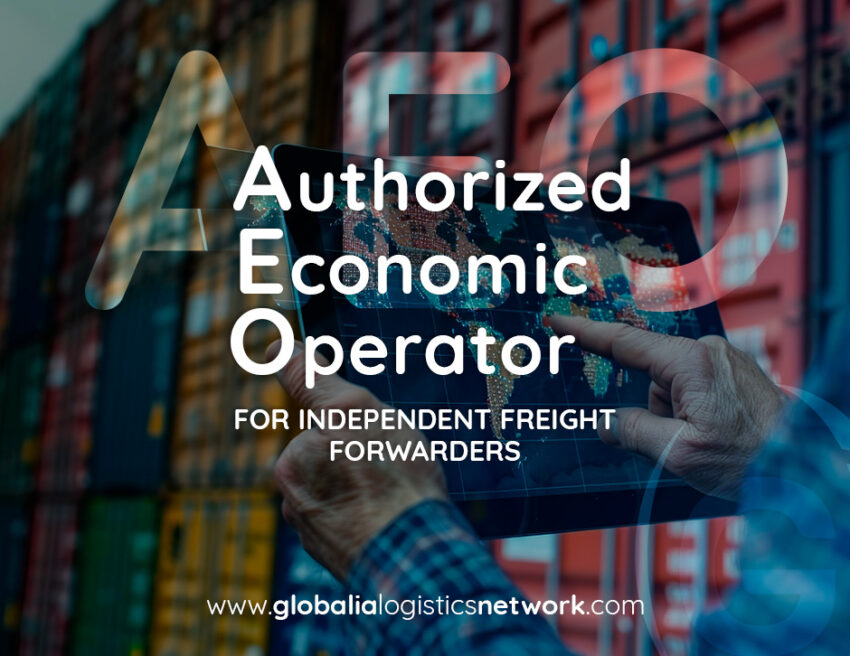Imagine you’re managing a tight cross-border shipment. Your cargo is ready, your documentation flawless, and your trucks are on time—but then it hits a wall at customs. Delays. Inspections. Extra scrutiny. Sound familiar? Now, imagine a scenario where your shipments are prioritized, you face fewer inspections, and customs authorities recognize your reliability across borders. That’s the power of AEO certification. In a logistics world that’s becoming increasingly compliance-driven and efficiency-focused, independent freight forwarders have much to gain by understanding and obtaining AEO (Authorized Economic Operator) certification. It’s no longer just for multinational logistics giants—AEO is becoming essential for even small and mid-sized forwarders looking to grow, compete, and offer premium services in global supply chains.
This blog breaks down what AEO certification means, why it matters, and why independent freight forwarders should not only care—but actively pursue it.

Understanding AEO: The basics
Authorized Economic Operator (AEO) certification is a voluntary, internationally recognized accreditation awarded by a national customs authority to businesses that demonstrate high standards in customs compliance, record-keeping, financial solvency, and security practices.
Originating from the World Customs Organization (WCO) SAFE Framework of Standards, AEO aims to secure and facilitate global trade. Certified businesses are considered “trusted traders” and enjoy benefits such as faster customs clearance, reduced inspections, priority treatment at borders, and enhanced reputation with stakeholders.
There are different levels of AEO certification depending on the country. For example, in the European Union, companies can be certified as AEO-C (customs), AEO-S (security), or AEO-F (full). In the United States, the equivalent is the CTPAT (Customs Trade Partnership Against Terrorism) program. Many countries across Asia, Africa, and Latin America have also implemented AEO schemes aligned with the WCO’s guidelines.
Why AEO certification matters in today’s global trade
Supply chain disruptions, stricter customs regulations, and rising geopolitical risks have made global trade more complex than ever. In this environment, governments are focusing on “trusted trader” programs like AEO to enhance security while facilitating smoother trade flows.
Businesses with AEO certification signal to customs that they are compliant, reliable, and low-risk. This trust translates into faster border processing and fewer bottlenecks—a vital advantage in today’s just-in-time and e-commerce-driven logistics world.
For independent freight forwarders, who often operate in a highly competitive market dominated by bigger players, AEO provides a clear differentiation. It demonstrates professionalism, compliance capabilities, and a commitment to global best practices—traits that shippers and partners look for when choosing logistics providers.
Why independent freight forwarders should care about AEO certification
1. Leveling the playing field
One of the biggest challenges independent freight forwarders face is competing with large multinational logistics companies that already have established reputations, global networks, and advanced compliance systems. AEO certification helps bridge that gap. It proves that even as a smaller operator, you meet internationally recognized standards of quality, security, and reliability. This accreditation opens doors to new clients—especially large exporters, importers, or government-linked firms—who often prefer or even require partners with AEO status. It positions your business as a serious, capable player in international trade.
2. Faster and more predictable customs clearance
The biggest operational benefit of AEO is the reduced time spent at customs. Certified companies are typically subject to fewer physical and document inspections, enjoy priority processing during disruptions, and can use simplified customs procedures.
For independent freight forwarders, this speed and predictability is a game changer. It allows you to offer premium service levels, meet tighter delivery windows, and build a reputation for reliability—which, in the freight forwarding world, is priceless.
3. Lower operational costs
Every day that a container sits at the port costs money. With AEO certification, faster clearance and fewer inspections translate into lower storage charges, demurrage fees, and detention costs. There’s also a reduction in administrative work due to simplified procedures and less paperwork. This operational efficiency gives independent freight forwarders an edge in pricing and profitability. You can pass the savings on to customers or reinvest them into growing your business.
4. Better relationships with customs authorities
AEO-certified businesses enjoy a more collaborative relationship with customs. You’re not just another entity being inspected—you’re a trusted partner. This often means having a designated contact point within customs, receiving advanced information on regulatory changes, and resolving disputes more efficiently.
This improved rapport can help independent freight forwarders navigate regulatory changes, audits, or unforeseen customs issues with greater ease.
5. Global recognition through MRAs
Many countries have entered into Mutual Recognition Agreements (MRAs), which means that your AEO status in one country can be recognized in another. For example, the EU has MRAs with countries like Japan, the United States, China, and several others.
This global recognition expands the benefits of AEO beyond national borders, making it a powerful tool for independent freight forwarders engaged in international shipments. It can help you establish new trade lanes and partnerships in different parts of the world with greater confidence and credibility.
What does the AEO application process involve?
While the process differs slightly by country, AEO certification typically involves:
-
An application to the national customs authority
-
A comprehensive self-assessment questionnaire
-
Providing evidence of customs compliance, financial health, and safety protocols
-
A physical audit or site visit by customs officials
-
Implementation of robust internal controls, staff training, and risk management procedures
While it may seem like a daunting task, many customs authorities offer guidance throughout the process. Additionally, consulting firms or logistics associations often provide support to help independent freight forwarders through their AEO journey.
Challenges and considerations
AEO certification is not a one-time achievement—it requires ongoing commitment. Certified companies are subject to periodic audits and must maintain high standards to retain their status. This means investing in staff training, IT systems, and internal controls.
For independent freight forwarders, these investments can be significant. However, when weighed against the long-term benefits—reduced delays, improved customer satisfaction, and access to global markets—the ROI is strong.
It’s also worth noting that the certification process can take several months. Planning, preparation, and a phased approach are key to success.
Wrapping up: AEO is the future, and the future is now
As international trade continues to tighten its focus on compliance, traceability, and security, AEO certification is becoming the gold standard. It’s no longer a “nice-to-have” but a strategic must-have, even for smaller logistics players.
For independent freight forwarders, AEO offers a chance to future-proof their business, gain a competitive edge, and build a brand based on trust and excellence. In a world where every shipment counts and every minute matters, the advantages of AEO certification go far beyond a customs badge—they represent your license to grow.
If you’re an independent freight forwarder looking to elevate your operations, win new clients, and unlock global opportunities, it’s time to stop asking if AEO is right for you—and start asking when you’re getting certified.


